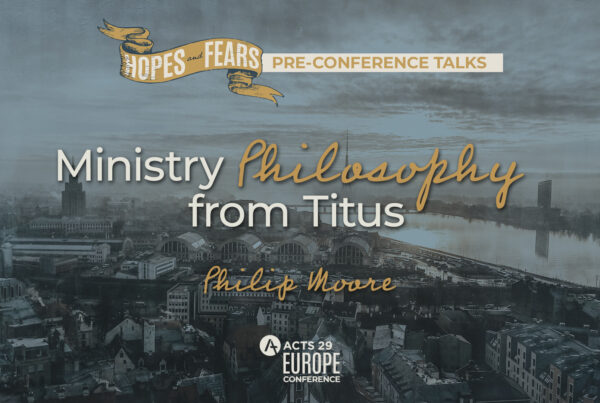We are a network of church-planting churches characterized by theological clarity, cultural engagement and missional innovation.
The first six paragraphs below are to do with robust theological clarity and should provide the framework and motivation for the cultural engagement of the seventh paragraph. Please do not skip them – but if you must, please get to the seventh paragraph and respond with us.
Refugee crises are nothing new. Ever since man turned his back on God in Eden, restless, homesick humanity has been wandering the face of the earth looking for home.
Sometimes we find somewhere to put down roots. We think it is home, and it certainly feels like it. But it is fragile, precarious and often illegitimate, viewed from the standpoint of history. Natural disaster, political upheaval, greedy invaders, insane extremists, religious or atheistic – all these factors have contributed over time to the ebb and flow of people and people-groups, across those artificial lines we draw on maps to stake our claim to our territory.
The Syrian refugee crisis is a stark reminder of some of these truths.
The harrowing images we have seen are at the same time too much and too little. Too much, because that photo was not an anonymous, token Syrian but a child beloved of his parents, whose name we know. Too little, because even the megaphone of suffering that it represents cannot shout loud enough to communicate the horror of what is happening.
The most influential book ever written is, in its old and new testaments, a pure product of refugees & scattered marginals.
It is sobering to think that the single most influential book ever written is, in its old and new testaments, a pure product of refugees and scattered marginals. The presumptuous West, with its illusion of settledness and permanence, would do well to look at Syrians fleeing their familiar landscapes and reflect on this text:
When you have entered the land the Lord your God is giving you as an inheritance and have taken possession of it and settled in it, 2 take some of the firstfruits of all that you produce from the soil of the land the Lord your God is giving you and put them in a basket. Then go to the place the Lord your God will choose as a dwelling for his Name 3 and say to the priest in office at the time, “I declare today to the Lord your God that I have come to the land the Lord swore to our ancestors to give us.” 4 The priest shall take the basket from your hands and set it down in front of the altar of the Lord your God. 5 Then you shall declare before the Lord your God: “My father was a wandering Aramean, and he went down into Egypt with a few people and lived there and became a great nation, powerful and numerous. 6 But the Egyptians mistreated us and made us suffer, subjecting us to harsh labor. 7 Then we cried out to the Lord, the God of our ancestors, and the Lord heard our voice and saw our misery, toil and oppression. 8 So the Lord brought us out of Egypt with a mighty hand and an outstretched arm, with great terror and with signs and wonders. 9 He brought us to this place and gave us this land, a land flowing with milk and honey; 10 and now I bring the firstfruits of the soil that you, Lord, have given me.” Place the basket before the Lord your God and bow down before him. 11 Then you and the Levites and the foreigners residing among you shall rejoice in all the good things the Lord your God has given to you and your household. Deuteronomy 26:1-11
1.“The land the Lord your God is giving you” – The earth is the Lord’s and everything in it. We do not own Europe. God does. And from the perspective of Romans 4:13, the promised land of the Old Testament is subsumed in the promised inheritance of the whole world to those who share Abraham’s faith, which is due at the consummation of all things at the return of Christ. There is no longer any such thing as a promised land for God’s people, the church, because we are not an earthly nation. Thus the downpayment of our inheritance is not some land now, and more land later, but the Holy Spirit who lives in us, unites us with Christ and makes us live for God’s glory (Ephesians 1).
The downpayment of our inheritance is not some land now…but the Holy Spirit who lives in us & unites us with Christ
2. Deuteronomy 26:1 calls the land an inheritance because it comes from the Lord to whom all things belong and who distributes all things as he pleases. Let us dwell a little longer on the idea of inheritance. Listen to Calvin on the same idea in Psalm 61:5:
But inheritance— the word here employed by David—suggests that the people of God enjoy a special of prosperity more solid and enduring; their momentary and short-lived troubles having only the effect of promoting their eternal welfare. He praises God that those who fear his name are not left to the poor privilege of rejoicing for a few days, but secured in a permanent heritage of happiness. The truth is one which cannot be questioned. The wicked, having no possession by faith of the divine benefits which they may happen to share, live on from day to day, as it were, upon plunder. It is only such as fear the Lord who have the true and legitimate enjoyment of their blessings. [1]
3. We can go further. If land as an inheritance means we cannot assume our land is our own, then possessions (Deuteronomy 26:1) are ours only in Christ. This means that we are obliged to share not only our land, but our possessions and resources with those in need. Calvin again, this time on 1 Timothy 4:
Now Paul’s doctrine proceeds on this principle, that there is no good thing, the possession of which is lawful, unless conscience testify that it is lawfully our own. And which of us would venture to claim for himself a single grain of wheat, if he were not taught by the word of God that he is the heir of the world? Common sense, indeed, pronounces, that the wealth of the world is naturally intended for our use; but, since dominion over the world was taken from us in Adam, everything that we touch of the gifts of God is defiled by our pollution; and, on the other hand, it is unclean to us, till God graciously come to our aid, and, by ingrafting us into his Son, constitutes us anew to be lords of the world, that we may lawfully use as our own all the wealth with which he supplies us.
Justly, therefore, does Paul connect lawful enjoyment with “the word,” by which alone we regain what was lost in Adam; for we must acknowledge God as our Father, that we may be his heirs, and Christ as our Head, that those things which are his may become ours. Hence it ought to be inferred that the use of all the gifts of God is unclean, unless it be accompanied by true knowledge and calling on the name of God. [2]
Paul’s theology of inheritance and possessions is radically different from ours. It is neither a capitalist nor a communist approach. Applied at the level of the state, it humbles those worldly powers who have forgotten that their calling is to steward God’s world for God’s glory, without partiality. It is a radically Christ-centered approach that reminds us that in Adam we forfeited our rights to all that is good: land, sustenance, comfort, plenty; and that only in Christ, the heir of the whole world, can anything properly become ours, be used lawfully and legitimately for our good and for the good of others in the light of eternity.
When we understand that we are heirs in Christ…then bringing the first & best parts of the land is a joyful responsibility.
4. From this point of view we should understand that the good we legitimately enjoy as joint-heirs of Christ here and now, pales in comparison with the good we will enjoy at the consummation of all things. We are radically free in respect of worldly goods to share them with those in need; and deeply compelled by love of God and neighbour to pursue that option. This is the sense and motivation of the bringing of the first-fruits (Deuteronomy 26:4) to God in our passage above. When we understand that we are heirs, and what we have is an inheritance intimately connected to who we are in Christ and to what we will receive in him, then bringing the first and best parts of the land and its produce is a joyful responsibility.
5. This becomes a reality in our lives when we activate our collective memory. The poignant refrain of Deuteronomy 26:5 – My Father was a wandering Aramean… – is part of our credo. It reminds us of Ephesians 2:11 – Therefore remember what you once were … – those of us who are saved by grace through faith in Christ are really refugees. Just as the spiritual adoption by God of spiritual orphans encourages us to take care of literal orphans, so the realisation of our spiritual refugee-hood pushes us towards care for refugees. Christians are refugees who have found a refuge in Jesus-Christ. This is the beautiful logic of verse Deuteronomy 26:6-11 above. The first-fruits are brought to the temple, and the Levites, the Israelites and the foreigners rejoice together – and what brings this about is a robustly theological approach to land and possessions coupled with the presence of refugees in the land. Their presence is our opportunity to live out the gospel.
Wells will be built, and refugees taken care of as we plant churches that live out the gospel.
6. But there is a further step to take. It is the temple in Jerusalem that will be the guarantee of the just redistribution of resources in the light of the searing theology of land and possessions and the stark reality of refugees that we have examined. Transposed into New Testament terms, then we are obliged to say that the expression of God’s people on earth is to be the conduit of God’s holistic grace to humanity. Churches should be at the forefront of the humanitarian effort to deal with this crisis. And as Steve Timmis has said elsewhere – if we want to build wells in Africa, let us plant churches and teach this theology which will motivate all who come under its message to be the answer to the poor, the marginalised, the refugees in their midst. Wells will be built, and refugees taken care of as we plant churches that live out the gospel.
7. And so we should expect two things as a network of churches: first, that our churches in Europe take a lead in dealing first-hand with the crisis; and, second, that our sister-churches in America and across the world get in touch to ask what they can do to help. By God’s grace, both are true. Acts 29 churches in Scotland, Poland, Italy and Turkey are taking a real lead in helping, practically, deal with this crisis. Acts 29 churches in the States are waiting for our lead on how to help. We will detail these initiatives in further blog posts – suffice to say that they are credible, trustworthy projects that aim to deal holistically with the human and spiritual need that we are now confronted with in Europe. If you want to assist please get in contact by clicking the button below.
[1] John Calvin, Commentary on the Psalms.
[2] John Calvin, Commentaries on the Epistles to Timothy











